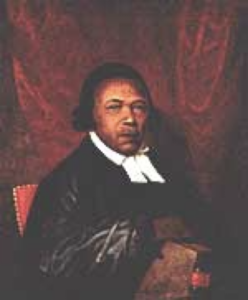
Quarterly, the St. James Racial Justice and Reconciliation Commission will spotlight an individual recognized in the Episcopal Church’s Lesser Feasts and Fasts who also represents cultural, gender, or ethnic diversity. The following is summarized from a biography presented to the General Convention of the Episcopal Church in 2022.
Absalom Jones was born enslaved to a wealthy Anglican planter in 1746. The planter recognized Jones’s intelligence and ordered that he be trained to work in the house and taught to read. When he was 16, Jones moved to Philadelphia with his “master” and joined St. Peter’s Church. In 1784, he was freed.
Jones left St. Peter’s and began worshipping at St. George’s Methodist Episcopal Church. The congregation applied for membership in the Episcopal Diocese of Pennsylvania. In 1794, it was admitted as the African Episcopal Church of St. Thomas. Bishop William White ordained Jones as a deacon in 1795 and as a priest in 1802.
Jones was an earnest preacher. To him, God acted on “behalf of the oppressed and distressed.” But it was his constant visiting and mild manner that made him beloved by his congregation and by the community. St. Thomas Church grew to more than 500 members during its first year. Known as “the Black Bishop of the Episcopal Church,” Jones was an example of persistent faith in God and in the Church as God’s instrument. He died in 1818 and is celebrated by the Church on February 13.
